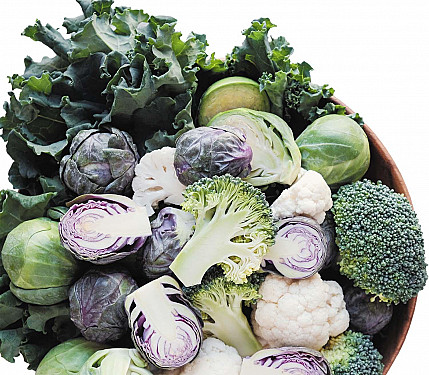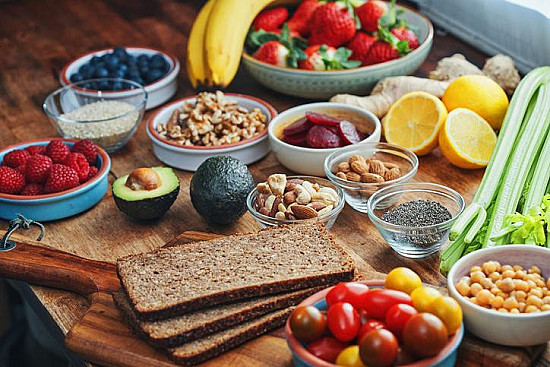How to prevent colorectal cancer
|
Image: Thinkstock |
Simple strategies can help you avoid this common cancer.
Colorectal cancer prevention starts with getting colonoscopies once every 10 years (or more often, depending on your risks), but it shouldn't end there. You can do a lot more to lower your risk for this disease, which is the third most common cancer in both women and men. Here are a few easy cancer-prevention steps you can incorporate into each day.
Replace at least one serving of meat each week
"Red and processed meat has been the dietary factor most consistently linked to colon cancer," says Dr. Andrew Chan, associate professor in the Department of Medicine at Harvard Medical School and gastroenterologist at Massachusetts General Hospital.
The danger may stem from how we cook red meat—grilling or pan-frying at high temperatures releases cancer-promoting chemicals. The culprits in processed meats like salami, bacon, and hot dogs are preservatives—nitrates and sulfites. These additives might themselves cause cancer or feed the gut bacteria that contribute to colorectal cancer development, Dr. Chan says.
Although there's no strict guideline as to how much you should limit red meat for cancer prevention, less is always better. Try to switch at least one serving of red meat a week for a healthier protein—like tofu or fish.
Put a date with exercise on your daily calendar
Exercise is one of the best-researched ways to reduce the risk of colon cancer. Studies have consistently found that adults who are more active cut their risk by 30% to 40% compared with those who are sedentary.
If you can't fit in an entire 30 minutes of exercise at once, do it in increments. A 10-minute brisk walk in the morning, some squats and weighted arm raises while you watch TV, and a few hikes up and down the stairs should fill your daily quota.
Make a food swap
Eating a healthy diet will help prevent obesity and keep your waistline within the recommended 35 inches or less for women—both of which will also help prevent colon cancer. One easy way to trim down your daily calorie count and your waistline is by making substitutions. Instead of buying white bread, get 100% whole grain. Swap French fries for spinach, broccoli, or green beans. The fiber in green vegetables and whole grains might also offer modest protection against colon cancer.
Get more calcium and vitamin D
Studies have suggested that people who get more calcium and vitamin D daily have a lower risk for colorectal cancer. The minimum amounts studies have recommended are 700 milligrams per day of calcium, and enough vitamin D to achieve a blood vitamin D level of 30 nanograms per milliliter (ng/mL).
Although you can get vitamin D through diet and supplements, the biggest source is from sunlight on your skin. How much vitamin D you need from your diet depends on your sun exposure and skin tone. To get more calcium and vitamin D, you can add food sources such as low-fat dairy, salmon, tofu, and fortified orange juice. Have a discussion with your doctor about whether it's worth adding a supplement based on your dietary calcium and vitamin D intake and colon cancer risk.
Stub out a bad habit
The connection between smoking and colon cancer is strong, particularly among female smokers. One study estimated that women who smoke are 19% more likely to get this cancer than their nonsmoking counterparts. For ideas to help you quit and increase your odds of success, talk to your doctor or a smoking cessation counselor (you can reach one through the National Cancer Institute—877-44U-QUIT or www.smokefree.gov).
Consider a daily aspirin
An aspirin a day may combat inflammation, which is a risk factor for many cancers, and block the effects of enzymes involved in cancer development. It's too early to recommend that all women take daily aspirin for the purpose of cancer prevention, says Dr. Chan. But women who are already taking a low-dose aspirin each day for heart disease prevention could gain an added benefit, and aspirin may be worth adding for women who are at very high risk for colon cancer.
Schedule screenings
One of the best ways to prevent colorectal cancer is by finding and removing polyps before they turn cancerous. Get screened once every 10 years (up to age 75) if you're at average risk for the disease; more often if you have a strong family history, inflammatory bowel disease, or other risk factors. Colonoscopy is the gold-standard detection method. But if you can't tolerate the prep or the procedure, flexible sigmoidoscopy and fecal occult blood tests are other options.
Disclaimer:
As a service to our readers, Harvard Health Publishing provides access to our library of archived content. Please note the date of last review or update on all articles.
No content on this site, regardless of date, should ever be used as a substitute for direct medical advice from your doctor or other qualified clinician.
















